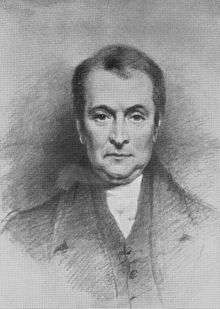John Kidd (chemist)
John Kidd (10 September 1775 – 7 September 1851) was an English physician, chemist and geologist. Kidd was born in Westminster, the son of a naval officer and was educated at Christ Church, Oxford.
John Kidd | |
|---|---|
 | |
| Born | 10 September 1775 |
| Died | 7 September 1851 (aged 75) |
| Nationality | English |
| Scientific career | |
| Fields | Chemistry Geologist |
Biography
He became reader in chemistry at Oxford in 1801, and in 1803 was elected the first Aldrichian professor[1] of chemistry. He then voluntarily gave courses of lectures on mineralogy and geology: these were delivered in the dark chambers under the Ashmolean Museum, and there William Conybeare, William Buckland, Charles Daubeny and others gained their first lessons in geology. Kidd was a popular and instructive lecturer, and through his efforts the geological chair, first held by Buckland, was established.
The first of the scriptural geologists, "Kidd argued in his book A Geological Essay on the Imperfect Evidences in Support of a Theory of the Earth, on philosophical grounds, that a science of observation cannot claim certainty for its inferences as to causes, and that consequently theoretical geology cannot stand against an indisputable authority such as revelation."[2] In 1818 he became a fellow of the Royal College of Physicians; in 1822 regius professor of medicine in succession to Sir Christopher Pegge; and in 1834 he was appointed keeper of the Radcliffe Library.
In March 1822 he was elected a Fellow of the Royal Society.[3] He delivered the Harveian Oration before the Royal College of Physicians in 1836.
Publications
- Outlines of Mineralogy (1809)
- A Geological Essay on the Imperfect Evidence in Support of a Theory of the Earth (1815)#
- The second Bridgewater Treatise: On the Adaptation of External Nature to the Physical Condition of Man (1833).
See also
- Earl of Bridgewater for other Bridgewater Treatise
References
- The Aldrich chair of Chemistry was founded with an endowment given to the University in 1798 by George Aldrich. (Cf: Robert J P Williams, John S Rowlinson, Allan Chapman (edts.), Chemistry at Oxford: a history from 1600 to 2005, pp. 79-81, London: Royal Society of Chemistry, 2008 (ISBN 0854041397)).
- Millhauser, Milton, [1954] The Scriptural Geologists: An Episode in the History of Opinion, Osiris, Vol. 11,The University of Chicago Press, p. 70
- "Library and Archive Catalogue". Royal Society. Retrieved 21 January 2011.

- "JOHN Kidd (1775-1851)". British Medical Journal. 2 (4733): 734. September 1951. PMC 2069801. PMID 14869708.
External links
